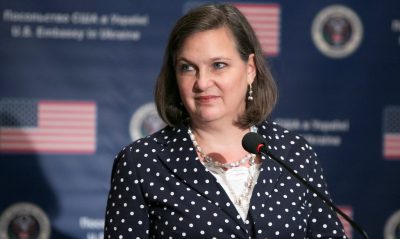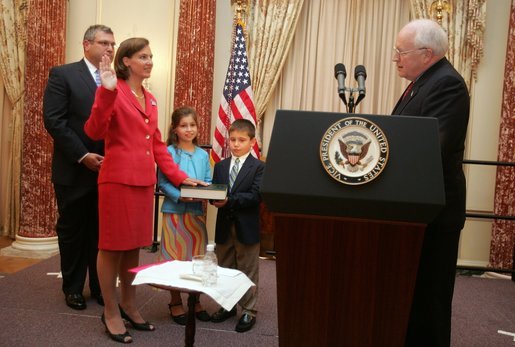Deep State Emissary: What Fresh Mayhem Does Nuland’s Beirut Visit Portend?
Lebanon’s crisis has been precipitated in large part by the U.S., Saudi Arabia, and Israel and cannot be solved until these rogue actors stop their foreign meddling

All Global Research articles can be read in 51 languages by activating the “Translate Website” drop down menu on the top banner of our home page (Desktop version).
Visit and follow us on Instagram at @crg_globalresearch.
***
Wherever Victoria Nuland goes, she brings trouble.
Nuland is the third most powerful person in the State Department.
In February 2014, she famously handed out cookies to demonstrators in the Maidan Square in Kyiv.
The demonstrators were mounting a coup against Ukraine’s democratically elected president Viktor Yanukovich, which set off a deadly seven-year war that has resulted in 14,000 deaths.
In mid-October 2021, Nuland visited Beirut, Lebanon.
A few days before, protests had broken out over the government’s handling of an explosion in the Port of Beirut in August 2020 that caused 218 deaths, 7,000 injuries and $15 billion in U.S. property damage.
The protests were suppressed, and six demonstrators were killed and 32 wounded.
In a meeting with Lebanon’s foreign minister, Abdullah Bou Habib, Nuland pledged an additional $67 million to the Lebanese army (bringing total military aid to $187 million for 2021).
Nuland also spoke in Beirut with members of the ultra-right-wing political party called the Lebanese Forces (LF) of which Samir Geagea is the leader.
A Christian Maronite, Gaegea is a notorious war criminal, responsible for the death of thousands of Palestinians and Lebanese during the Lebanese civil war (1975-1990).
Gaegea served eleven years in solitary confinement from 1994-2005 after being convicted for ordering four political assassinations, including of Lebanon’s Prime Minister Rashid Karami in 1987.
Today, Gaegea appears ready to kick off another civil war in his bid for power. Iranian TV suggested that he is an Israeli Mossad agent who was behind the massacre at the port explosion protests and has “sought to impose himself as the sole representative of the Christians and return to the sectarian stronghold by committing a deliberate and organized massacre like the one committed during the Lebanese civil war.”
Deep Roots of Lebanon’s Crisis
Lebanon has been in bad shape for a long time. The quality of life of its people has been eroded by government corruption, the decline of social services, and by an influx of Syrian refugees.
Last summer, the Lebanese Lira sank at one point to 24,000 to the dollar. A year earlier, the government defaulted on its debts.
Saree Makdisi compared Lebanon’s central bank in The Nation Magazine to a “shell company running a collapsing Ponzi scheme out of an abandoned warehouse in an insalubrious part of town. A hundred and 30 billion dollars’ worth of deposits had vanished into thin air.”
The plight of the Lebanese is so bad right now that war-ravaged Syria is supplying them with electricity along with sanction-stricken Iran.
The United States, Israel and Saudi Arabia have helped sow divisions in the country by spreading anger at Hezbollah—the resistance group—and the Shia political Amal movement.
For many of Lebanon’s people, however, Hezbollah and the Amal represent their only salvation and hope; they provide them with free education and economic help.
Even many of the Christians speak well of them—as they know that Hezbollah and Amal parties are the ones who will help the needy and poor.
Port Explosion and protests
Lebanon’s divisions threatened to boil over following the August 2020 port explosion, which was set off when a cargo of 2,750 tonnes of ammonium nitrate (equivalent to around 1.1 kilotons of TNT) had been stored in a warehouse without proper safety.
Initially, blame for the explosion—considered the largest non-nuclear one in recent history—was placed on those responsible for managing the port and on the Lebanese government.
Then Israeli Prime Minister Benjamin Netanyahu alleged that Hezbollah had been running a missile factory at the port, and maintained secret arms depots in civilian areas in Beirut.
When Secretary-General of Hezbollah Hassan Nasrallah invited reporters to tour a warehouse in the Beirut suburb of Jnah, they did not find any missile factory though various Lebanese news sites reported images and videos taken from that particular warehouse showing there was ammonium nitrate stored—but by the Lebanese government and not Hezbollah.
The current judge on the case, Tarek Bitar, and several Lebanese MP’s have placed blame with the last sitting prime-minister, Hassan Diab, who was informed about a dangerous situation four days before the accident by the port authorities.
However, governments before him, like that led by Premier Saad Hariri (son of the murdered Rafic Harriri) knew all too well about the deadly cargo in the port of Beirut and even received complaints and letters, but never did anything about it.
The protests that surrounded Nuland’s visit were led by Hezbollah and the Amal Party and were directed against Judge Bitar.
Hezbollah spokesmen claimed that Christian snipers from the Lebanese Forces (LF) faction were the ones to fire at the crowd to drag Lebanon into strife—a claim denied by the LF.
Press TV in Iran claimed that an employee of the U.S. Embassy in Beirut was one of the “snipers” who allegedly killed the protestors in a black-flag incident—though this has not been substantiated.
Pouring Gasoline on the Fire?
Nuland’s recent visit brings fear among the Lebanese that the U.S. is about to pour fire on an already volatile situation.
Besides her exploits in Ukraine of 2014, Nuland has been a key figure advocating for regime change in Russia (an article she published in Foreign Affairs last year was called “Pinning Down Putin,”) and served as a principal foreign policy advisor to Dick Cheney during the Iraq War.
Additionally, she was U.S. ambassador to the North Atlantic Treaty Organization (NATO) from 2005-2008 when it was pushing for expansion along Russia’s border and leading the fight in Afghanistan.

Nuland being sworn in as U.S. Ambassador to NATO in July 2005 by her boss Dick Cheney. [Source: georgewbush-whitehoiuse.archives.gov]
The Lebanese have experienced hardship for many years and do not want another civil war.
Like in Syria, the countries’ sectarian divisions have been provoked largely by the West and Israel—the Zionist state and not Jewish people—which has long sought to elevate the Maronite Christians and weaken and divide Lebanon.
The campaign to demonize Hezbollah is part of a hybrid war between Israel and Iran that is one major source of the country’s current predicament.
*
Note to readers: Please click the share buttons above or below. Follow us on Instagram, @crg_globalresearch. Forward this article to your email lists. Crosspost on your blog site, internet forums. etc.
Sonja is a freelance journalist from the Netherlands who has written about Syria, the Middle East, and Russia among other topics. Sonja can be reached at: [email protected].

